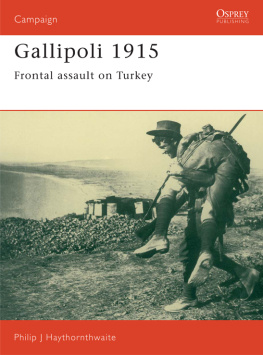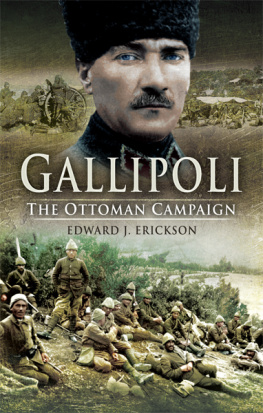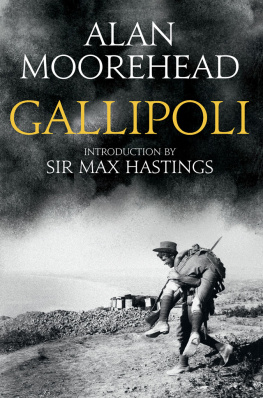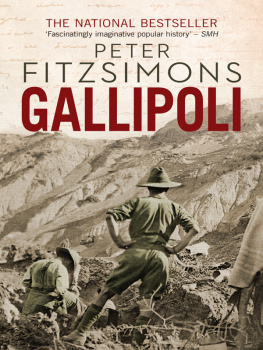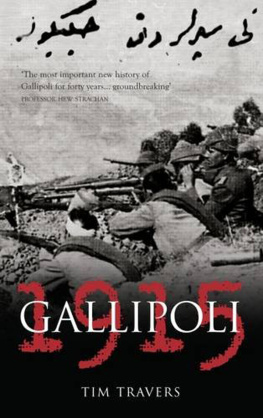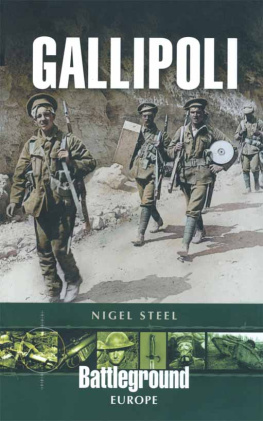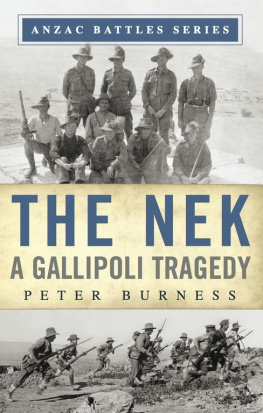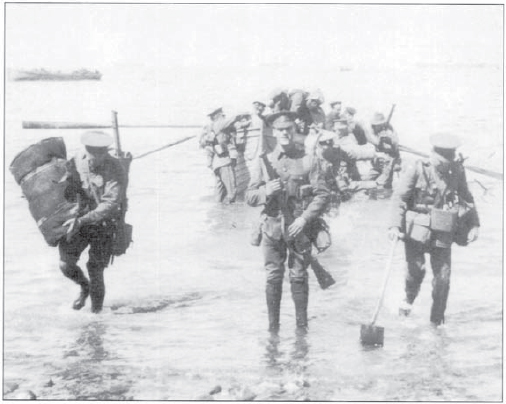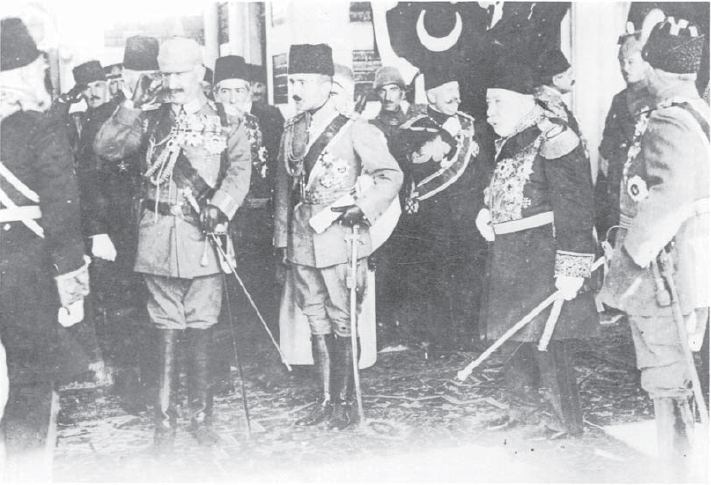Campaign 8
Gallipoli 1915
Frontal assault on Turkey
Philip J Haythornthwaite
Series Editor Lee Johnson
CONTENTS
ORIGINS OF THE CAMPAIGN
The expedition to the Dardanelles was a direct result of the deadlock which arose on the Western Front with the beginning of trench warfare after the first weeks of the First World War; but its origins lay in the confused sphere of Balkan politics.
Long regarded as the sick man of Europe, the tottering Ottoman Empire had suffered the repressive rule of Sultan Abdul Hamid II (the Damned) from August 1876 until his deposition in 1909. The new Sultan then installed was Mohammed V, Abdul the Damneds younger brother, but he was merely a figurehead: all power was concentrated in the hands of the instigators of Abduls overthrow, the Young Turks. This youthful group of politicians, revolutionaries and opportunists restored the constitution abolished by Abdul in 1877, but ran the empire with equal tyranny. They were an odd collection: Talaat Bey, the political leader, who was the real controller of the empire; Djavid Bey, Finance Minister, a Jewish financier from Salonika; and, most significantly, Enver Pasha, the half-Albanian War Minister who had fought against the Italians in Libya and in the Balkan War of 1912-13, during which he had shot the then War Minister for endeavouring to arrange a peace which he saw as disadvantageous to Turkey. Enver was hated by the empires minority groups, by the older generation of the politicians who had supported Abdul the Damned, and by the army, following his dismissal of 1,200 politically suspect officers in 1913; but he remained the power behind the Young Turk government.
By 1914 Turkeys financial situation was critical, desperately weakened by the Balkan Wars. Within the government were conflicting views on foreign aid: Minister of Marine Djemal, for example, favoured a French alliance, but the dominant voice was Envers, whose experience as military attache in Berlin had convinced him of the advantages of closer ties with Germany. These were cemented by early 1914 with the arrival of the German Military Mission, requested by the Young Turks and given the task of reorganizing the Turkish army. Led by General Liman von Sanders, it had begun its work with considerable effect.
In the event of a European war, Turkeys geographical position was crucial. Half Russias exports (nine-tenths of her grain) passed through the Bosphorus and the Dardanelles, this route being Russias main contact with her allies, Britain and France. It was thus of great importance to those nations that Turkey remain neutral in the event of hostilities, but two days before the outbreak of war, Germany and Turkey agreed an alliance against Russia, but one which did not commit Turkey to military action. Great indignation was aroused in Turkey when, on the following day, two dreadnought battleships which had been built in Britain for the Turkish navy, and which were almost completed, were requisitioned by Britain (Sultan Osman I, which became HMS Agincourt, and Reshadieh, which became HMS Erin). This played into German hands: immediately, as a gesture of solidarity, they sent the battlecruiser Goeben and the light cruiser Breslau to Turkey, to become part of the Turkish Navy. Enver, temporarily seeming to have lost his nerve and currently negotiating a Russo-Turkish alliance, was informed when the two ships had evaded the British fleet in the Mediterranean and were waiting to enter the Dardanelles; to admit them would be to confirm Turkeys links with Germany to the exclusion of the Allies. He ordered them to sail through.
The Allies became increasingly alarmed at the possibility of Turkish entry into the war, and by early September the British Naval Mission (which had been training the Turkish Navy) was withdrawn; German command was consequently extended to the Turkish Navy. Without orders from the Turkish government, the German commander of the Dardanelles fortifications (Weber Pasha) closed the waterway, in direct contravention of international law; but Enver and Talaat had so delivered Turkey into German control that despite protestations from some members of the government, Turkey was now firmly in the German camp. On 29/30 October Goeben, Breslau and other vessels, nominally Turkish but crewed partly by Germans, bombarded Russian shore establishments on the Black Sea coast; Djemal claimed ignorance of the raid, but probably Enver and Talaat had been informed. Russia, Britain and France issued an ultimatum to the Turkish government, and when it remained unanswered hostilities began officially on 31 October 1914.
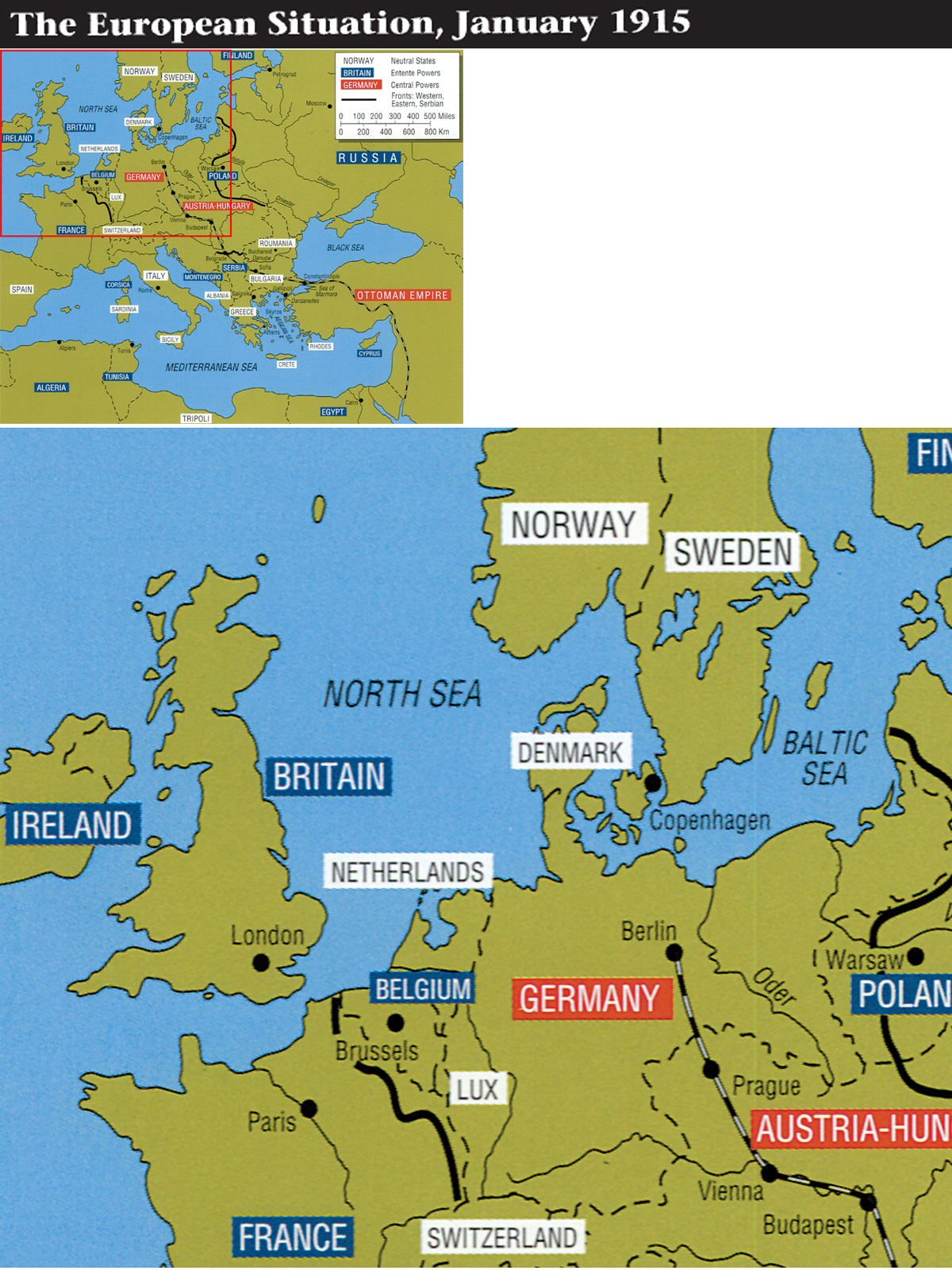
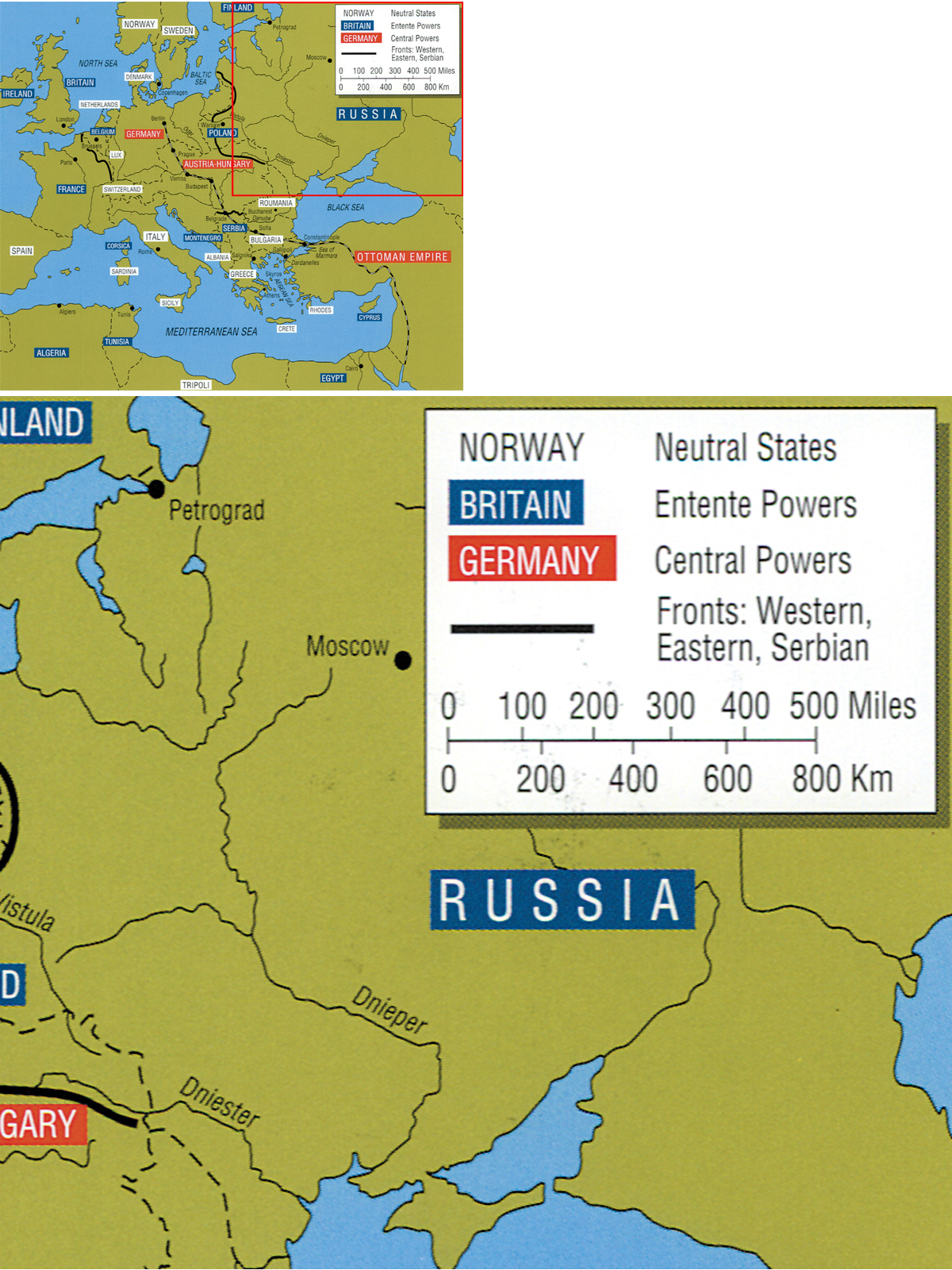
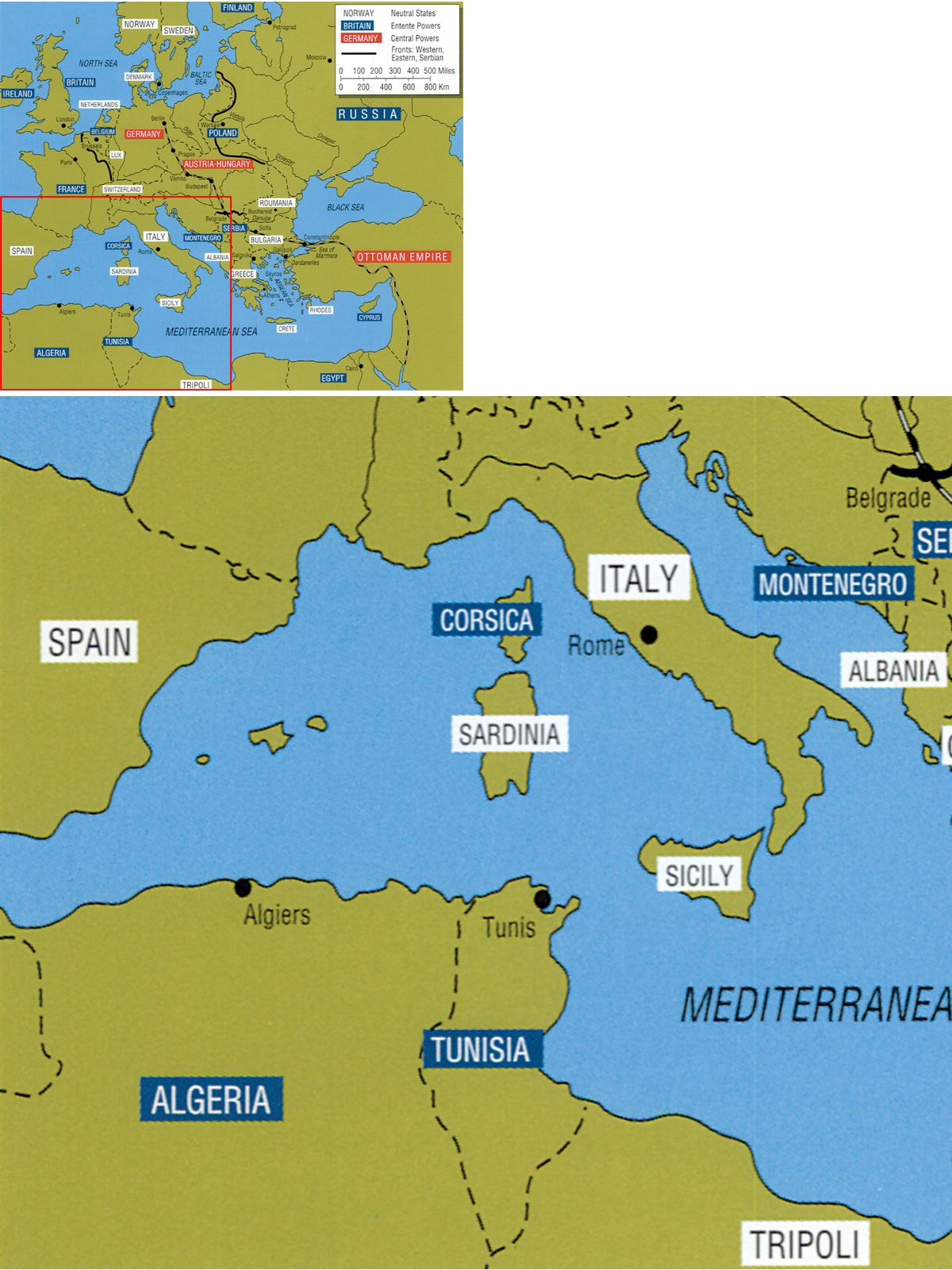
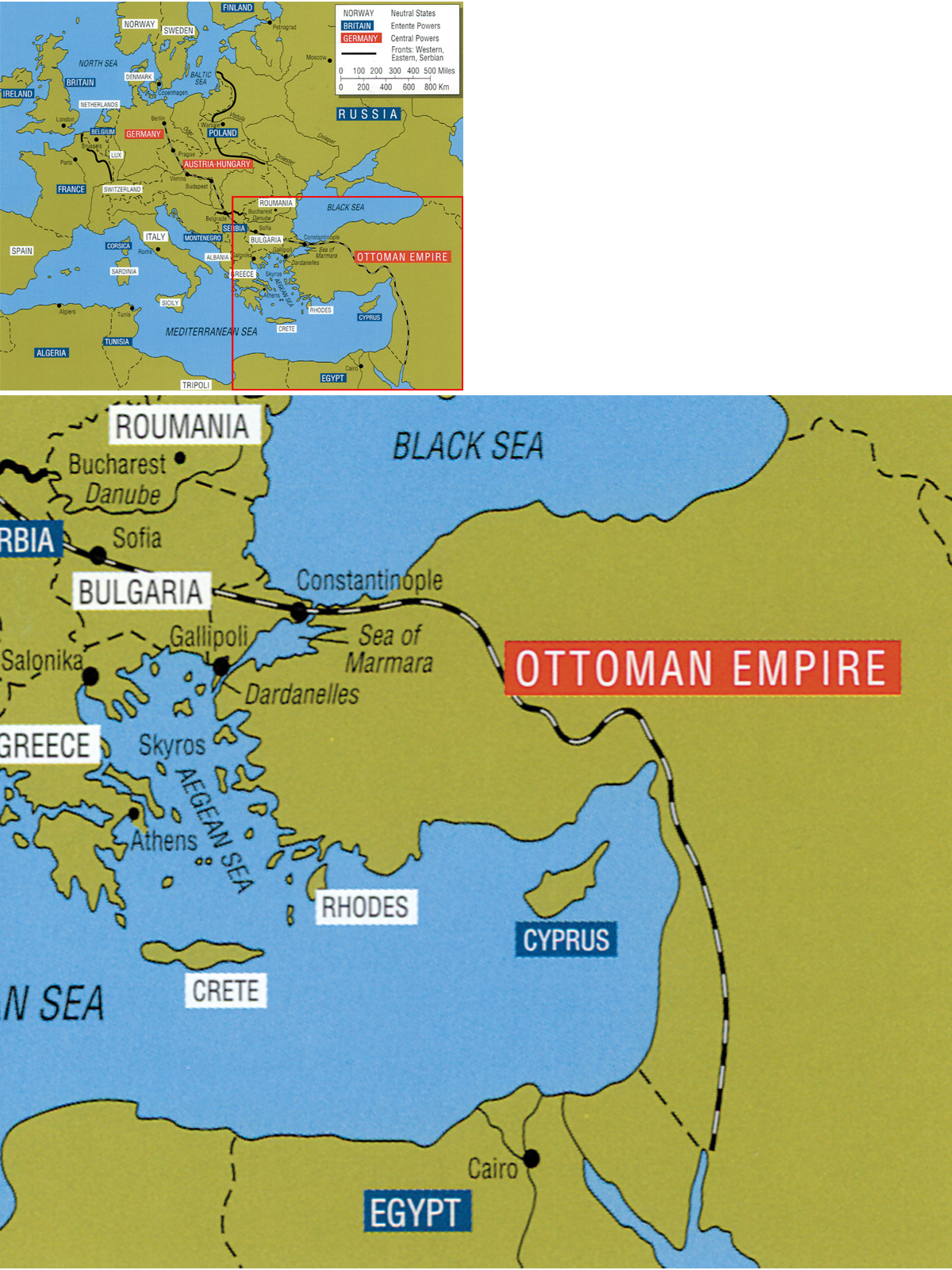
By the beginning of 1915 it was obvious that the war would be protracted; trench-lines ran from the North Sea to Switzerland, and already it was obvious that on this Western Front a rapid decisive victory was unlikely. Russia, in addition to fighting the Turks in the Caucasus, had suffered severely on the Eastern Front, at the battles of Tannenberg and the Masurian Lakes, and it was feared that their military effort might collapse if the Germans launched an offensive of major significance. In an attempt to relieve the pressure on Russia came the plan to attack the Dardanelles.
The German-Turkish alliance: the visit of Kaiser Wilhelm II to the Sultan. To the Kaisers left are Enver Pasha, Talaat Bey (background, dark uniform), Abbas Hilme the ex-Khedive, and Rifaat Bey, chairman of the Turkish senate. (Australian War Memorial, neg. no. H 12323)
The genesis of the idea originated before the outbreak of war, in discussions between the Secretary of State for War, Lord Kitchener, and Winston Churchill, First Lord of the Admiralty, although their original plan was for the expedition to be undertaken by Greece, at that time in sympathy with the Allied powers. King Constantine of Greece, however, was related by marriage to the German Kaiser Wilhelm II, and had become increasingly pro-German.
Upon the receipt of a plea from Russia for help in distracting Turkish resources, the Dardanelles plan was resurrected and discussed in the British War Council. Initially Churchill and Lord Fisher (First Sea Lord) considered a Greek landing on the Gallipoli peninsula, which took its name from the main town and was the key to the Dardanelles and the passage to the Sea of Marmara, to Constantinople and thence to the Black Sea. This would be accompanied by a Franco-British landing on the Asiatic side of the channel, with the Dardanelles being forced by a squadron of old British battleships which, being outdated, could not be risked in a battle with the German fleet and were thus regarded as expendable. Churchill was interested especially in this latter concept, despite the difficulties that had been experienced when Admiral Duckworths British fleet had attempted the same manoeuvre, unsuccessfully, in 1807. The concept, however, was sound; once the fleet had overcome the decrepit Turkish shore-batteries and entered the Sea of Marmara, it was hoped that Greece (if not already in the Allied camp), Bulgaria, and perhaps Roumania and Italy, would abandon their neutrality and join a Balkan coalition against Turkey; and securing the Dardanelles and Sea of Marmara would allow Russian ships again to pass from the Black Sea to the Mediterranean, enabling munitions to be delivered to Russia and Russian grain to the western Allies. The plan, which has been termed the only truly innovative strategic concept of the entire war, met with approval from both politicians and military authorities; Kitcheners approval was doubtless greatly influenced by the fact that few military resources were envisaged, and thus the effort on the Western Front would not be compromised. It was believed that the appearance of a British fleet off Constantinople might cause the downfall of the Turkish government, and as Turkeys only two munitions factories were within range of naval gunfire, even a short bombardment (against which the Turks were believed to be powerless to reply) could effectively remove Turkey from the war at a stroke. Russia received the plan with enthusiasm, and France offered a naval squadron to serve under British command in the great enterprise against Constantinople.

